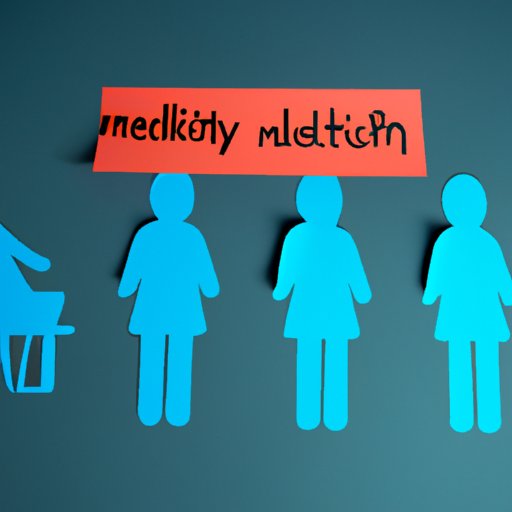Introduction
Mental health is a broad term used to describe a person’s psychological and emotional wellbeing. It includes aspects such as mood, thoughts, behavior, and social functioning. Disability, on the other hand, is defined as any physical or mental condition that impairs an individual’s ability to perform tasks or activities necessary for everyday life. The connection between mental health and disability is complex and often misunderstood. In this article, we will explore the relationship between these two concepts and investigate their implications in terms of legal rights, employment, and education.
Examining the Relationship Between Mental Health and Disability
The relationship between mental health and disability is complicated and often misunderstood. In order to fully understand their connection, it is important to examine both the legal implications and the impact on employment opportunities.
Exploring the Legal Implications of Mental Health as a Disability
In the United States, the Americans with Disabilities Act (ADA) defines a disability as “a physical or mental impairment that substantially limits one or more major life activities.” This definition includes mental health conditions such as depression, anxiety, bipolar disorder, post-traumatic stress disorder (PTSD), and schizophrenia. Under the ADA, individuals with these conditions are protected from discrimination in the workplace, housing, public services, and other areas. Additionally, employers must provide reasonable accommodations for those with mental health disabilities.
Understanding How Mental Health Impacts Employment Opportunities
Despite the protections provided by the ADA, individuals with mental health disabilities still face significant barriers when it comes to finding and maintaining employment. These include stigma, lack of awareness, and difficulty accessing resources. Employers may be reluctant to hire individuals with mental health disabilities due to a perceived lack of reliability or productivity. Furthermore, individuals may find it difficult to disclose their condition to prospective employers due to fear of discrimination. As a result, those with mental health disabilities often struggle to find and maintain gainful employment.

Investigating the Impact of Mental Health on Education
Mental health can also have a significant impact on educational opportunities. Those with mental health disabilities may face a variety of challenges when it comes to pursuing higher education. These include difficulty managing time and completing assignments, difficulty focusing and concentrating, and difficulty interacting with peers and faculty. Additionally, there is often a lack of understanding and support from educators and administrators.
Assessing the Challenges Faced by Those With Mental Health Disabilities
The challenges faced by those with mental health disabilities in the educational setting can be overwhelming. Students may find it difficult to manage their course load, cope with the social aspects of school, and complete assignments on time. Additionally, they may experience isolation due to a lack of understanding from their peers and educators. As a result, students with mental health disabilities may find it difficult to succeed in the academic setting.
Exploring Mental Health Treatment Options for Those With Disabilities
Fortunately, there are a variety of treatment options available to those with mental health disabilities. These include psychotherapy, medications, lifestyle changes, and support groups. It is important for individuals to seek out the help and support they need in order to manage their condition and achieve their goals. Additionally, those with mental health disabilities should take advantage of the legal protections afforded to them under the ADA.
Conclusion
The relationship between mental health and disability is complex and often misunderstood. Those with mental health disabilities face significant barriers when it comes to employment and education. Fortunately, there are a variety of treatment options available and legal protections in place to help those affected by mental health disabilities. It is important for individuals to seek out the help and support they need in order to manage their condition and achieve their goals.
If you or someone you know is struggling with a mental health disability, please remember that you are not alone and there is help available. Reach out to a mental health professional and take advantage of the resources and support that are available.


